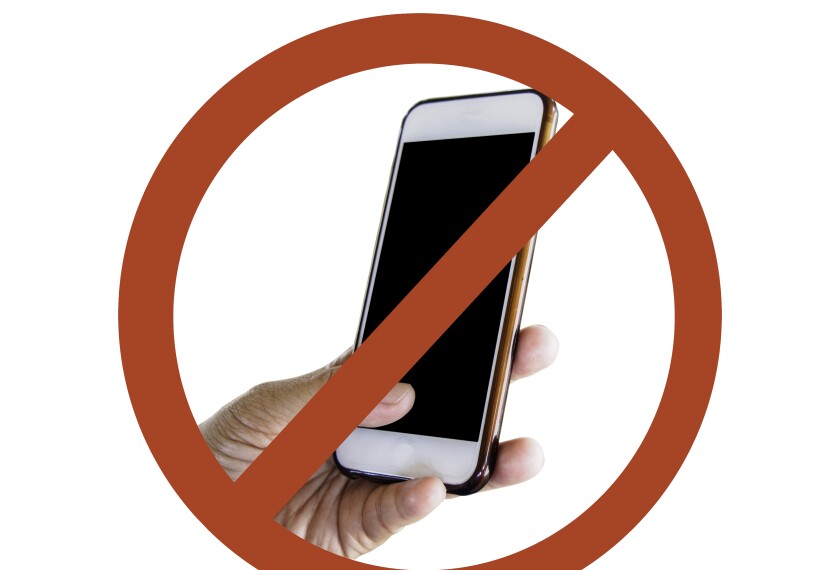Technology is rapidly changing schools—from artificial intelligence, to 1-to-1 computing, to learning management systems, as well the vast quantities of student performance data those technologies now produce.
But ask educators, and they will tell you that the ubiquitous cellphone is the tech that most disrupts classrooms and school environments.
At least 88 percent of teens own a personal smartphone, according Common Sense Media, and 43 percent of 8- to 12-year-olds own their have smartphones.
About 1 in 10 teachers, principals, and district leaders say that cellphones are banned in their schools while 22 percent believe that they should be banned on campus, according to an October survey by the EdWeek Research Center, which regularly polls educators across the country on education issues.
A little more than 200 educators used an open-ended question that asked them to share their perspectives on the survey topics to vent about their growing concerns over cellphones, with some comparing students’ use of cellphones to an addiction or describing circumstances where students became panicked over having their cellphones taken from them.
“The issue of high schoolers using cell phones during class is massive,” said one high school teacher from Washington state. “So many are constantly in need of the dopamine rush of checking their phones, texting, watching YouTube, etc., they’ve lost the ability to have any sort of sustained attention to anything.”
“The fight over cellphones is exhausting to teachers,” said a high school teacher from Pennsylvania.
“Students on cell phones are physically present, but not mentally present,” said a third high school teacher, this one from Iowa. “It is the single greatest threat to a quality education in the school at the present time.”
These issues are fueling a growing interest from educators—and even some parents—in banning cellphones in schools.
But does barring cellphones in class or across campus work? What have educators in schools with bans actually seen and experienced? As the responses show, many educators said bans have improved their classroom and school environments for the better, but the devil is in the details of implementation.
The upsides to cellphone bans at school
“We recently banned cellphones. Previously, they were allowed during passing time and at lunch. However, they had taken over instructional time. Students would get out their phones without thinking and teachers would have to spend as much time redirecting as they were teaching. That, or have a power struggle over confiscation.”
—District leader, Missouri
“We have recently implemented a no cellphone policy in our district and it has been life changing. The kids are working in class, talking to one another, and keeping out of trouble—for the most part.”
—High school teacher, Ohio
“We have had students put their phones in a magnetically sealed pouch powered off. It has helped to limit the distraction that phones bring. I used to think we should be teaching them how to use them responsibly, but now I believe that is not possible...it would be like trying to teach someone to use heroin responsibly. I prefer them to have zero access to their phones.”
—Middle school teacher, Wisconsin
“We have implemented ‘no cellphones’ during the school day for our middle school and have seen improvements with student interactions, especially at lunch time with playing board games and in the gym.”
—Middle school teacher, Indiana
“This is the first year our school has had a cellphone policy. I have always had one in my class, and I believe that my students have always been much more focused. I did not experience any negative interactions with students because I had a policy when other teachers didn’t. The kids just adapted to my expectations.”
—High school teacher, Minnesota
“I feel like students should not have a cellphone at any point in the regular school day. Our district has started a no cellphone policy this year and the difference has been strictly positive. Students are paying attention more in classes and there is nowhere near as much online bullying compared to previous years when cellphones were allowed.”
—Middle school teacher, Tennessee
“I do not allow cellphones in my classes. Students must place them in the calculator caddy and take a calculator. They hate it, they want their phones on them all the time. At the end of the year, I have a had students sheepishly admit that not having their phones helped them concentrate on their work.”
—High school teacher, Pennsylvania
“Cellphones were a big distraction in my classes last school year. The changes made by the district were needed and are helpful. We can already see the difference in student engagement and performance.”
—High school teacher, North Carolina
“My school has implemented a school wide no cellphone policy during class (unless approved by the teacher). We use phone vaults and students are used to using them. Now that students have the routine down, I no longer spend my time worrying about cellphone use. They know they are not allowed, they are placed in a pocket during class, and the school is unified in this process which is wonderful!”
—High school teacher, Idaho
Why cellphone bans at school don’t always work
“Our school has a ‘no cellphones in the academic classroom’ policy, but it is very inconsistently enforced. This makes it difficult to enforce a strict policy in my classroom. In some cases, parents argue about the policy and believe their children should be allowed access to their phones at all times.”
—High school teacher, Illinois
“Our school won’t enforce a cellphone policy building wide but wants each class to have an individual plan. The staff feels like a schoolwide phone policy is administrative work. Ultimately, we don’t have any enforceable cellphone policy. This is directly impacting students’ progress.”
—High school teacher, Washington state
“Phones cannot be policed unless the school administration has a strict no cellphone use policy with consequences. Nobody wants to touch the student’s property, and often students disregard requests to put it away. It’s impossible as a teacher to compete with the allure and addiction to the cellphone. It’s constantly alerting them, pinging, chiming, and crying for their attention.”
—Middle school teacher, New York
Cellphones are the cause of a myriad of problems, both in and out of class. No backing from parents to follow the district policy. In fact, parents will call and text their child even when they know they are in class. Sharing answers to tests, videoing fights and altercations and bullying are also major problems that could easily be solved by banning cellphones on campus. Unfortunately, I don’t see that ever happening through district follow-through.”
—High school teacher, West Virginia
“Our schedule is so complex and includes physically and mentally draining 90-minute blocks. No phone policy is new but adds layer of tension [between] me and my students.”
—High school teacher, Virginia
“No matter what the school rules are in the school they are not always enforced by each teacher. I have implemented a cellphone turn-in incentive program in my own classroom to limit cell phone usage during class.”
—High school teacher, Illinois
When cellphone bans are a nonstarter, try this:
“I recently had my 9th graders write a journal about a change they would like to see in our society, so we don’t wind up like characters in some of the dystopian literature we’ve been reading. Most admitted they think everyone should be on their phones less! They know that scrolling through TikTok and Instagram is a waste of time and only makes them feel worse, but they are also addicted to it. … When I talk to kids about their cell phone use, I let them know that it’s not just a teenager thing, that I can’t fully concentrate on lesson planning or grading papers if my phone is right next to me. When I share my own struggles and observations, they are much more likely to respect my rule of putting their phones in a slot by my desk for the duration of class. My own daughter admitted that she was annoyed but also relieved when teachers required students to put their phones in one of those organizers because it took the pressure off.”
—High school teacher, North Carolina







